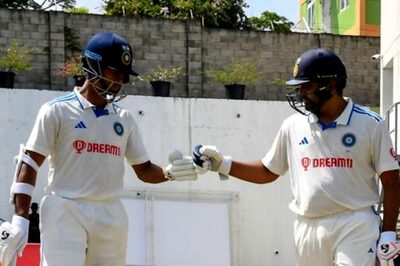
views
New Delhi: The draft JPC report on 2G scam has questioned NDA's decision to grant concessions to telecom companies on licence fee despite protests by Telecom Minister Jagmohan and says the then government had to "forego" over Rs 42,000 crore in offering Migration Package to cellular operators. On the issue of extending concessions to telecom operators such as moratorium on payment of licence fee, the panel said the government went ahead despite opposition by then Telecom Minister Jagmohan who was supported by then Finance Minister Yashwant Sinha.
The draft report also said that by offering Migration Package, the government had to forego revenue to the tune of Rs 42,080.34 crore. "A perusal of the note initiated by the then Minister of Communications (Jagmohan) revealed that he was in complete disagreement with the representations made by the operators, who demanded a moratorium on payment of licence fee for two years and extension of period of licence from 10 to 15 years," the draft report said.
Jagmohan was of the view that "there was no legal, financial, commercial or moral justification for agreeing to the representation made by the operators." He added he strongly favoured the option to recover all the outstanding dues from the operators.
The report, however, appreciated the decision of the Atal Bihari Vajpayee government to review the telecom policy "to facilitate India's vision of becoming an IT superpower and develop a world class telecom infrastructure in the country." Jagmohan had drawn the attention of the then Finance Minister Yashwant Sinha on the issue of non-recovery of licence fee on December 21, 1998. Sinha is a member of the JPC.
In his communication dated December 24, 1998, the Finance Minister, while sharing his concern over non-recovery of huge amount of licence fee, mentioned that this would add to the budget deficit of Rs 2,800 crore in the relevant year's Budget, the draft said. "As regards the demand of the telecom operators for concessions in licence fee payments, he (Sinha) held the view 'that businessmen should learn to take the responsibility of their decisions as they cannot be votaries of free market on the one hand and come back to the government for a bailout in such a situation on the other.'
"It is, however, surprising that despite serious observations by the two ministers regarding granting of concessions to the telecom service providers, the proposal was allowed to be processed unhindered," the draft report said. It said the DoT, "at no point of time," calculated the loss suffered by the exchequer due to the Migration Package.
"The Committee have, however, been informed that impact on licence fee and spectrum charges collection due to the Migration Package was to the tune of Rs 43,523.92 crore, which included the sum of revenue - Rs 1,443.58 crore foregone on account of extension of effective date of licence by six months," said the draft.
It said according to the DoT, the Migration Package did not provide for recovery of the amount of Rs 42,080.34 crore (after excluding Rs.1443.58 crore). "...The Committee are, therefore, inclined to conclude that the Government also had to forego revenue to the tune of Rs 42,080.34 crore in the course of offering Migration Package vide NTP (New Telecom Policy)-1999," the report said.
The Committee appreciated that the government of the day viewed the ensuing developments with concern which could adversely affect the further development of the telecom sector and recognised the need to take a fresh look at the policy framework for this sector. "It was wisely felt that a new telecom policy framework was required to facilitate India's vision of becoming an IT superpower and develop a world class telecom infrastructure in the country," it said.
The report recalled that the then government constituted a Group on Telecommunications in November, 1998 with the mandate to formulate recommendations on the proposed New Telecom Policy as well as address issues relating to existing licensees of basic and cellular services and suggest appropriate remedial measures within the framework of New Telecom Policy.




















Comments
0 comment